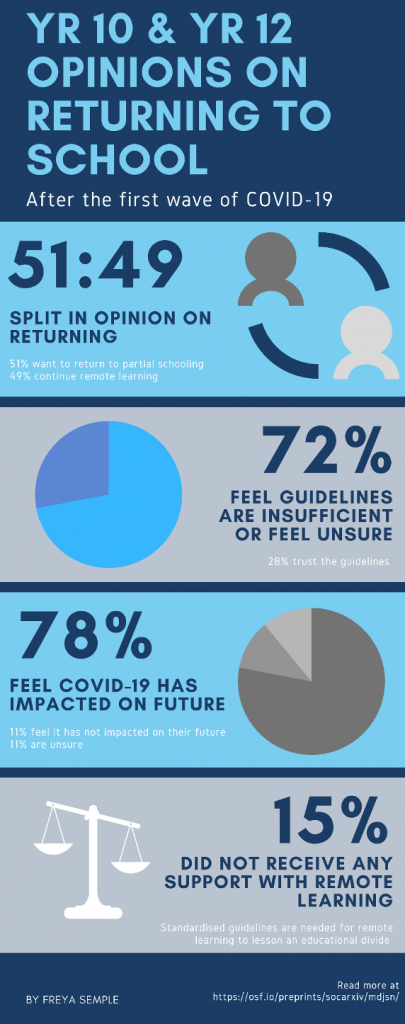By Liverpool YPAG,
My name is Freya Semple and I am a 17 year old member of GenerationR Liverpool YPAG. I am hoping to study at university in the near future and my favourite hobbies consist of rowing and ballet. In the summer I returned to school for two weeks between 15th to 26th of June to recap school content taught remotely during in the COVID-19 lockdown. Before students returned, I carried out a research project to collect student views on returning to school for these two weeks. This is the first research project I have conducted, and I did it because the students views on returning to school need to be represented. I think it is important that young people have a say in the decisions which impact them. They do not vote, and it seems unfair that their thoughts and valid contributions are not considered by the Government. I hope that through this research project I can provide some insight into what young people are saying and so that their concerns with returning to school can be addressed.
On May 10th, 2020 the UK Government announced that Secondary Schools, Sixth Forms and Further Education Colleges could provide some face-to-face support for year 10 and year 12 students after June 1st 2020, though this was subsequently deferred to start on 15th June (1). Students in these year groups have national exams in Summer 2021.
Government guidance to reduce the spread of COVID-19 in schools consists of regular cleaning of frequently touched surfaces, minimizing student contact by changing classroom layouts and timetabling staggered breaks (2).
It is not apparent that the Government has engaged with the school students affected most by this decision. Students have not been given a platform to raise their concerns about returning to education. Their views have not been heard.
This motivated me to conduct a prospective study to collate the views of young people and publicise their concerns. It is important to involve young people in decisions that affect their situation so that they engage with the policy (3). Year 10 and year 12 students are also of an age where their opinions should be taken into account.
This study was conducted to explore the opinions of year 10s and 12s concerning returning to partial school after the first wave of the covid-19 outbreak in June 2020. The aim was to provide a voice to young people on returning to partial schooling in June 2020. Students were invited to express their preferences on returning to school; their views about safety with respect to government guidance on return to school; how they feel COVID-19 will impact on their future and how COVID-19 has impacted on their education.
This study informed members of the public and policy makers about the opinions of year 10 and 12 students returning to school in the UK at the end of the first wave of the SARS-CoV-2 outbreak.
Qualitative research using a prospective survey was conducted from the 20th to 27th May 2020. Participants were year 10 (age 14 to 15 years old) and year 12 (age 16 to 17 years old) school students in the United Kingdom.
A 12-question survey was compiled on Google Forms™ with 9 close-ended questions and 3 open-ended questions. The survey was distributed to the students via two online Facebook™ forums specific to their year groups: The A level Forum (6,500 members) and a GCSE forum (36,000 members). The survey was accessible on multiple platforms (computers and smartphones) and multiple web browsers.
The 3 open ended questions were subject to Braun and Clarke themed analysis. Thematic analysis is a method for identifying and interpreting patterns of meaning across qualitative data. This meant recurring themes in the written data could be addressed and the reasons behind students’ answers could be found without influence. Braun and Clarke analysis provides a qualitative six phased method of thematic analysis. Firstly, I familiarised myself with the qualitative data and noted general ideas. NVIVO (v12) software was used to group the qualitative data into codes (similar patterns in the data). Themes were then put together by grouping the codes. I then reviewed and defined each theme in relation to the research measures.
There was a rapid uptake from students with 1534 responses in 7 days. 
Year 10 and 12 school students are evenly divided in opinion about whether they should return to school on 15th June. This uncertainty appears based on the majority of students having concerns about schools’ ability to comply with government guidance, particularly around social distancing and the risk of transmission. Some students recognised a need to return to education despite this perceived risk. This uncertainty could be addressed by better engagement from policy makers with school students. School students expressed desire that their students’ concerns are addressed by the Government and better explanation of the reasoning behind returning certain students to school at this time whilst other members of the community continue to isolate.
Policy makers should standardise remote learning. This will ensure all students receive some educational support during pandemics, ensuring the educational divide caused by a lockdown is minimized.
As England enters a second lockdown this research remains relevant as a record for students’ views on returning to school after the first wave. As the incidence of covid-19 increases and we enter a second lockdown it will be interesting to see how student views on schooling have changed.
If you would like to read the full report click here! https://osf.io/preprints/socarxiv/mdjsn/